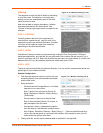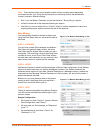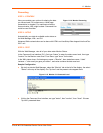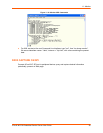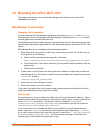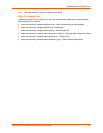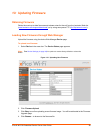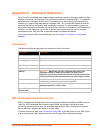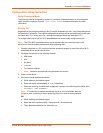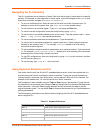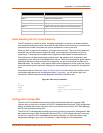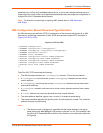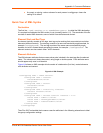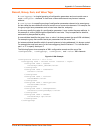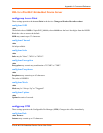
xPico® Wi-Fi® Embedded Device Server User Guide 70
Appendix A: Command Reference
The xPico Wi-Fi embedded device server supports three convenient configuration methods: Web
Manager, Command Line Interface (CLI) and Extensible Markup Language (XML). This appendix
describes how to configure the xPico Wi-Fi embedded device server using the Command Line
Interface (CLI) and/or Extensible Markup Language (XML). CLI provides an interactive mode for
accessing the device configuration and management interface. It is most suited for system and
network administrators comfortable with using similar interfaces on Enterprise IT and Networking
products. It is also helpful as a quick tool for access via the product's serial ports or console/
management ports. XML provides an extensible mode for software developers.
For more information about the Web Manager, see the Chapter 3: Configuration Using Web
Manager.
Conventions
The table below lists and describes the conventions used in this book.
XML Architecture and Device Control
XML is a fundamental building block for the future growth of Machine-to-Machine (M2M) networks.
The xPico Wi-Fi embedded device server supports XML configuration records that make
configuring the device server easy for users and administrators. XML configuration records are
easy to edit with a standard text editor or an XML editor.
For a brief overview of XML, see Configuration Using XML. It provides rules on basic XML syntax,
a guide to the specific XML tags used, and a guide to using XML configuration records.
Convention Description
Bold text Default parameters.
Italic text Required values for parameters
Brackets [ ] Optional parameters.
Angle Brackets < > Possible values for parameters.
Pipe | Choice of parameters.
Warning Warning: Means that you are in a situation that could cause
equipment damage or bodily injury. Before you work on any
equipment, you must be aware of the hazards involved with electrical
circuitry and familiar with standard practices for preventing accidents.
Note Note: Means take notice. Notes contain helpful suggestions, information,
or references to material not covered in the publication.
Caution Caution: Means you might do something that could result in faulty
equipment operation, or loss of data.
Screen Font
(Courier New)
CLI terminal sessions and examples of CLI input.



